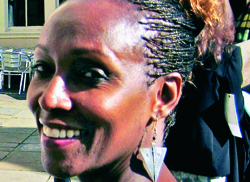
The birth of Storymoja transformed Kenya’s literary scene, empowering established and aspiring writers by providing a platform to hone their skills and tell their stories. Muthoni Garland’s appearance on the literary scene could well be described as an out- of-the-blue affair. Her name is synonymous with Storymoja, a publishing outfit that has revolutionised Kenya’s literary scene.
Storymoja dates back to 2007 when Gar- land and four like-minded writers met to discuss an idea. Their vision was to empower fellow Kenyans to write their own stories, get them published and help market them locally and internationally. The idea was to change the reading culture in Kenya which, they opined, was lax, since reading books for leisure, rather than academics, was rare.
A brainchild of Garland, Storymoja publishes books under the Storyhippo and Storykiboko brands. The annual Storymoja Hay Festival offers authors a platform to showcase their work, and provides an environment where new talent can be discovered and nurtured. Another of Storymoja’s initiatives is the Start a Library project, which stocks school libraries with donated books. Storymoja also conducts the Storyhippo Creative Arts Programme, which runs writing and other creative work- shops for children and adults.
In addition to running Storymoja, Gar- land is an established author of fiction for both adults and children. Her work has been published in various literary journals such as Kwani?, Chimurenga and Farafina. Her short story, titled Tracking the Scent of my Mother, was shortlisted for the 2006 Caine Prize, which is awarded to an African writer of a published short story. Her other acclaimed book, Halfway Be- tween Nairobi and Dundori, is about the unpredictable nature of life, and how one’s moral standing can be above board one day, and questionable the next.
Garland has also authored a diverse set of children’s books targeted at children from kindergarten up to secondary school. The books, published under the name Muthoni Muchemi, include the title Kamau’s Finish – renamed The Amazing Race for use in schools in the UK and the USA. A science fiction title, Attack of the Shidas, authored by Garland with the aim of generating discussion about tribalism in schools in light of the rising ethnic hostility in Kenya, was recognised by the Kenya Human Rights Commission. Writing aside, Garland enjoys telling stories and has appeared on several stages, not just in Kenya but also in Italy and the United Kingdom. So who is Muthoni Garland, and how did she begin her literary journey?
“My entry into publishing began late – when I was way into adulthood. Having had a long career in marketing, I started writing books when I turned 40,” the mother of four says. An avid reader for as long as she can re- member, Garland describes herself as the little girl, teenager and young woman who was al- ways to be found buried in a book. She loved poetry from a tender age and spent a lot of time writing poems.
In the newly-independent Kenya of the 1960s, little Muthoni was one among four African children attending Beehive Board- ing School in Nanyuki. Although Kenya was independent, colonial attitudes were still prevalent. The young girl suffered bullying and discrimination. The traumatic experience caused her to stop speaking for a while, and she found solace in the world of books. It was a while before her parents caught on and re- moved her from the school, transferring her to Kilimani Primary School in Nairobi. She later completed her secondary school education at Maryhill Girls in Thika. After her secondary education, she had the opportunity to study in the United States, and although she was very keen on journal- ism, her parents wanted her to take a serious course. She compromised and decided to take Business Administration majoring in marketing, after which she immediately enrolled for a Master’s degree in International Relations; a course she never completed. She worked for a seafood company in Boston doing market research before moving back to Kenya three years later. On her return, she delved into advertising. She joined Ogilvy & Mather in the late 1980s and clawed her way up the ranks to become Client Services Director. She exited the advertising world in 1995, a year she considers her most traumatic.
One of her brothers committed suicide and her father died two months later from complications related to HIV, as they later discovered. Her first marriage also ended that same year. She remarried and, at the age of 40, accompanied her second husband on a job posting to Egypt, forcing her to close a thriving market research company that she had started. As a housewife, she reverted to writing poetry to pass the time, enrolling for an online poetry course in order to gain professional grounding. The course, however, failed to meet her expectations; it was too ‘classical’ for her needs. She wanted to write poems that could express her feelings, so she quit and embarked on writing fiaction. “The moment I wrote my first book, I knew it was something I would take more seriously than just a mere pastime,” she says. So when she returned to Kenya in the early 2000s, she began scouting for publishers for her manuscript. She thought the annual book fair was the place to find them, but she was in for a rude shock as most participants were teachers and school children. “I wondered where the rest of the adults were. Besides, every seller assumed that all adults present were teachers because it was only teachers who seemed to be interested in books!”
She also noticed that most of the books on offer lacked finesse and needed refining. “The editing was not thorough. The covers were not catchy; they needed more attractive designs. What’s more, I thought the books lacked an effective marketing strategy.” Concluding that there was a gap in Kenya’s publishing scene, she began to visualise herself and other upcoming writers as the ones who would fill the gap. She set her mind on pursuing this new-found interest and her eureka moment came with the Storymoja idea during the Kwani? Literary Festival. Kwani? – a literary journal that publishes fiction, poetry, photographs, experimental writing, cartoons and creative non-fiction, a departure from what traditional publishing houses do – relies heavily on donor funding, something that did not sit well with Garland.
While having a discussion with Kwani?’s founding editor, the thought of publishing books and selling them at an affordable cost to mwananchi – the average person – hit her. One could buy the books for 100 to 200 shillings just before boarding a matte home. “My big idea was to make books accessible to all Kenyans.” That is how she came to gather like-minded writers to found Storymoja in 2007, and immediately embarked on an aggressive marketing campaign. This was a bittersweet year for Garland as her mother, who had been living with HIV for over a decade, finally succumbed.
What started out as an experiment brought along its own lessons in publishing and entrepreneurship. “I did not come from a publishing background, and this may explain some of the ‘obvious’ mistakes made when we start- ed.” The mistakes included printing too many copies of their first two books. “This tied up all our capital,” she recalls. To add insult to injury, Storymoja advertised on expensive media platforms. They would never be able to recover the capital outlay even if they had sold all the books, she says. And, as if that was not enough, the launch of Storymoja’s first two books fell in December 2007 – the month Kenya’s worst bout of post-election violence broke out. Says Garland: “We sold less than 300 books, which was a far cry from our projections.
We were left with a huge stock of books, made losses and even contemplated closing down the business.” Some of the shareholders bailed out after the post-election violence. Garland’s advice to would-be publishers is to gain some experience in an existing publishing house.
“Look for a job in a publishing firm first, if only to get insights into the workings of the industry. Learn about the common pitfalls and potentials of the business. Meet suppliers and develop a good business strategy based on realistic costs and projections.” Selling books for the adult market proved to be a huge challenge, so she resolved to try something different. Because many adults thought reading was not for them, she decided to tap into the children’s arena. “As part of our launch in 2007, we had run a storytelling competition. We decided to turn the winning story – Land of the Kitchen – into a children’s book.
“The book is about Mwiko (a cooking stick) and Sufuria (an aluminium cooking pot), who worked together peacefully for years, but came to blows in a kitchen over a small matter,” she explains. Storymoja partnered with UN Habitat and Nairobi City Council schools to use this story as an intervention for children affected by the post-election violence. “We got our first 1,000 book order from this,” she says. To bring back the art of storytelling, Gar- land organised events where authors would talk about their work.
However, this did not draw huge audiences. It was during the annual Hay Festival in the UK, which brings writers and readers together to share stories and ideas at events worldwide, that she was struck by the idea of partnering with the organisers to replicate the venture in Kenya. That was the genesis of the Storymoja Hay Festival in Kenya, an annual event that celebrates stories through storytelling, reading books and discussing various literary works, workshops and music. Started in 2007, the festival brings together adults and school children, authors, novelists, teachers and other literary minds, providing a forum to explore and promote a reading culture in Kenya.
Despite its shaky start, Garland considers Storymoja a successful venture and her greatest achievement. In 2013, the Kenya Institute for Curriculum Development approved 26 of Storymoja’s books to be used in schools. Storymoja has published over 120 titles. She credits this to belief in herself and a passion for her business, coupled with her ability to manage and inspire people with her vision. She underlines her faith in the Storymoja concept: “The belief in my vision for Storymoja gave me the courage to sell some property to invest in the business.”
A business is deemed successful when one makes oneself dispensable and it continues to operate. Garland works at her office three days a week and works from home the rest of the time. That way she can concentrate on writing and editing.
“Although I’m the CEO and ultimately responsible for the financial performance of the business, I have invested in experienced man- agers who do not require the daily supervision I used to give when we started the business.”
